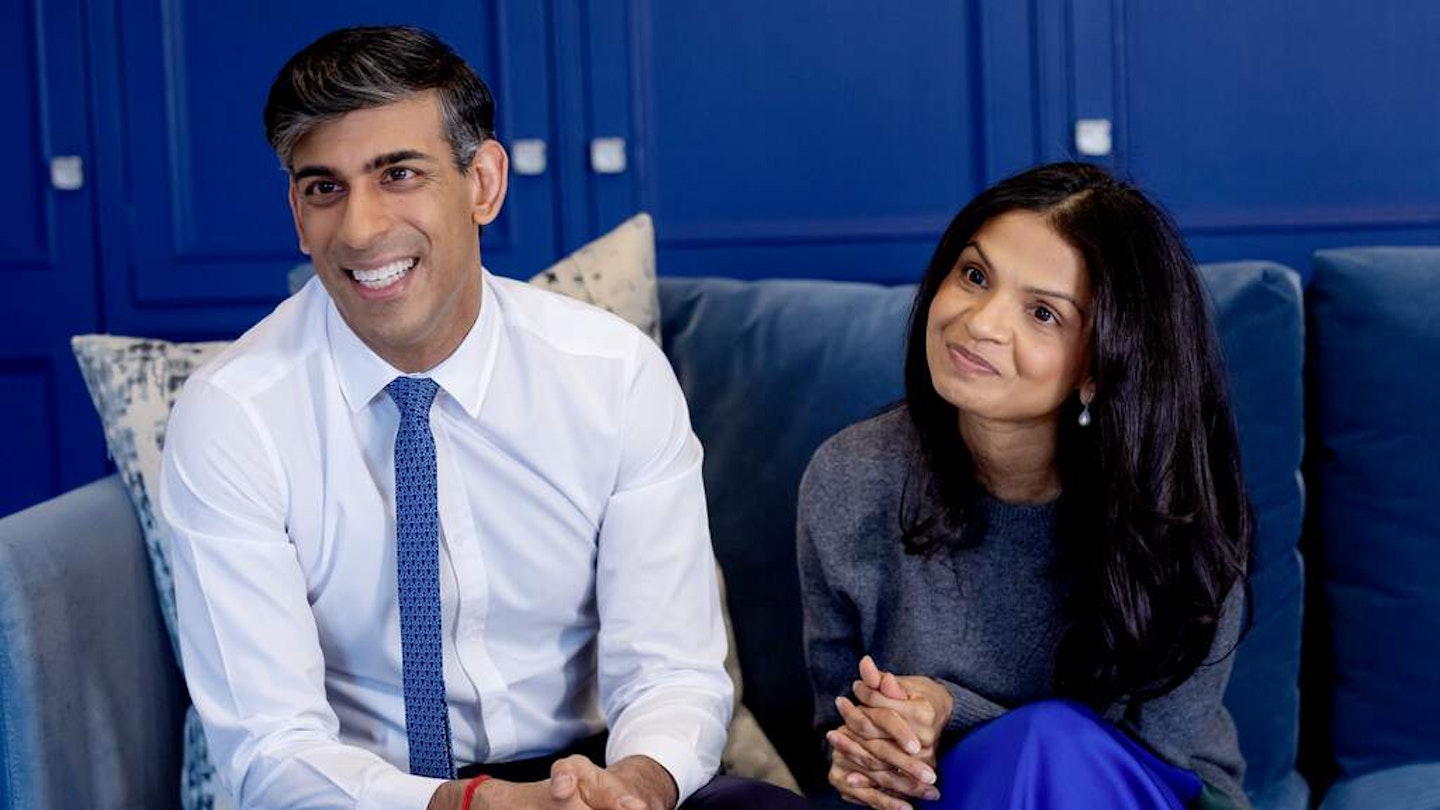Women, on average, do 65% of physical housework in heterosexual relationships, and with the additional mental burden that comes with running a home the so-called ‘chore gap’ is not something to shrug off.
Ahead of International Women’s Day, we found out how the country’s most high-profile couple share domestic duties. In their first ever interview of this kind together, Rishi Sunak is joined by his wife, businesswoman Akshata Murty, to discuss how they juggle it, albeit under phenomenally different circumstances to the rest of us: one of them is running the country and their combined wealth of more than £700m no doubt affords them help. Nevertheless, in election year we’re all keen to discover who our politicians really are, and how they operate at home is a good place to start.
Watch Grazia's full exclusive video of Rishi Sunak and Akshata Murty on how they share the domestic load:
When it comes to mealtimes at Number 10, where the couple live with their two daughters, Krishna, 12, and Anoushka, 11, Murty says her husband is the more talented cook, but owing to time constraints he sticks to rustling up breakfast on a Saturday morning: Gordon Ramsay’s scrambled eggs is his signature dish. Meal planning for the week sees Sunak laying out ‘the structure’, which Murty ‘fills in’. She says her husband is keen for the whole family to eat a balanced diet with protein, carbohydrates and vegetables, but he reveals no meal actually operates like that unless he’s there. ‘Well, you know, suddenly the homework’s not done and Anoushka’s like, “Oh I just need pasta,” so I have the pasta,’ Murty says.
Meanwhile, it’s Sunak who makes the bed. ‘I’m not a morning person,’ Murty laughs. ‘But you also just don’t like making the bed and it bugs me,’ Sunak says, adding, ‘I actually sometimes come up back into the flat from the office after we’ve all left to make the bed, because I’ll be irritated if it’s not been made.’
Fights about the dishwasher are also commonplace. Who's best at loading it? ‘Definitely Rishi, but I am “A” for enthusiasm,’ says Murty. ‘But then it requires redoing after you’ve been very “enthusiastic”,’ Sunak jokes.
A bone of contention for many families is which parent gets most time to themselves. According to a report last year from Pew Research Center, it’s usually men in heterosexual couples who enjoy the most leisure time. Women are often found to pick up most of the unpaid care and housework. But Murty admits that, actually, she has the most free time – perhaps hardly surprising given their unique circumstances.
‘I have more flexibility and so I’m able to control my schedule a bit more, whereas you don’t have flex or time,’ she says to Sunak. Murty also exercises more (her husband runs once or twice a week) and she reads far more books than he does.
‘I’m too exhausted when I get home so I watch an episode of Friends and go to bed,’ Sunak says. They’ve watched the same episodes of the sitcom countless times. ‘It never gets old,’ they add.
His least favourite chore is taking out the rubbish. ‘It’s a pain, you have to go all the way down there,’ he gestures. He also leaves the task of telling the kids to knuckle down to their homework to their mum.
‘I’m stricter when it comes to things related to school,’ Murty says, ‘like getting their homework done, making sure they are reading. Making sure that anything related to school is done well.’ But with everything else she says it’s Sunak who is the sterner parent.
Do the kids pitch in? ‘They’re good at putting all their clothes away’, says Sunak, with Murty adding, ‘They’re good at setting their wardrobe up and tidying. I’ve always gotten them to set the table, clean up after meals. It’s just what I did growing up,’ she says. ‘Make their beds,’ Sunak adds. ‘It would be nice if they walked the dog that they wanted to get a bit more often.’
They draw a line at rewarding their daughters’ chores with anything ‘obvious’, though. ‘I don’t believe in giving the children any incentives,’ she adds. ‘I believe we’re a family, we all have to work together, we all help each other out. That’s just the way life goes.’
